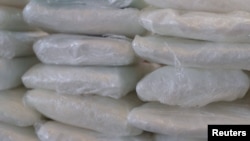The People’s Republic of China has taken what the White House calls “a valuable step forward” in helping to restrict the production of illegal fentanyl. Fentanyl is a synthetic opioid responsible for the dramatic spike in drug overdose deaths that have ravaged the United States in recent years.
National Security Council Spokesperson Sean Savett announced in a statement that the PRC will begin scheduling three essential precursor chemicals used in the manufacture of illicit fentanyl. Scheduling allows the substance to be subject to domestic and international controls. “This marks the third significant scheduling action by the PRC since President Biden met with [PRC] President Xi in November 2023,” Spokesperson Savett said.
He noted that this action follows the recent senior official Counternarcotics Working Group meeting between the United States and the PRC, where the two countries discussed key initiatives, among them, disrupting the illicit financing of transnational criminal organizations, accelerating the scheduling of precursor chemicals, and finding ways to increase law enforcement cooperation.
On the issue of law enforcement, in July the U.S. indicted a Chinese national, Minsu Fang, for his part in a conspiracy involving the importation of what is believed to be the largest amount of fentanyl precursors found in the southern district of Texas and one of the largest in the country. “We charged this defendant for importing enough fentanyl precursor chemicals from China to kill millions of Americans,” said Attorney General Merrick Garland in a statement. “Fentanyl is the deadliest drug threat the United States has ever faced, and the Justice Department is committed to breaking apart every link in the global fentanyl supply chain.”
To that end, the United States has also sanctioned more than two dozen Chinese entities and individuals involved in the production of chemicals used to make fentanyl. Following pressure by the United States, the PRC itself shut down some sellers of precursor drugs that are used by Mexican cartels to manufacture fentanyl. In June, China also cooperated with the United States in arresting a fugitive the United States charges was involved in a Chinese money-laundering network working with Mexican drug cartels.
The United States will continue to press the PRC to deepen its cooperation on disrupting the flow of fentanyl and its precursors into the United States. As U.S. Ambassador to the PRC Nicholas Burns said about bilateral efforts to combat synthetic drug trafficking, “This critical cooperation saves lives.”






